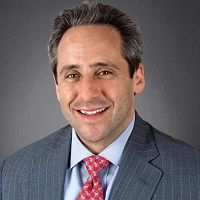For a Concentrated Stock Position, Ask Your Adviser This
There can be advantages to having a lot of stock in one company, but ‘de-risking’ can help avoid some significant disadvantages.


Market volatility, inflation and the pandemic have all amplified the need for investors to mitigate portfolio risks. Amid these factors, it’s vital to evaluate whether a disproportionately large portion of your portfolio is invested in any single stock — also known as a concentrated stock position.
While this investing approach isn’t always a negative, it can leave investors open to significant risk and potentially significant losses. Here are some key questions to ask your financial adviser when it comes to concentrated stock positions:
What are the general pros and cons of concentrated stock positions?

Sign up for Kiplinger’s Free E-Newsletters
Profit and prosper with the best of expert advice on investing, taxes, retirement, personal finance and more - straight to your e-mail.
Profit and prosper with the best of expert advice - straight to your e-mail.
While highly concentrated stock positions have created significant wealth for many investors, including some of the world’s wealthiest people (think Elon Musk, Jeff Bezos, Bill Gates, Warren Buffett and Larry Ellison), they can also produce the opposite effect.
It’s natural to be fascinated by the possibility that meteoric growth in a single holding could drastically increase your net worth, but also important to remember that concentrated positions can dramatically decrease your wealth. This is why diversification and “de-risking” techniques are critical components of most investing strategies.
Are there any legal restrictions related to the sale of concentrated stock ownership?
The SEC has rules to regulate stock sales by corporate insiders — generally officers and directors, as well as employees who have earned the stock as part of their compensation package. Typically, the “insider” can still sell some or all of the concentrated positions but needs to be aware of the applicable rules and transaction windows.
For example, 10b5-1 plans allow directors and officers to sell company stock during predetermined “open windows” that normally occur outside quarterly earnings announcements or the dissemination of other new information to the public that could cause the underlying stock price to change significantly.
What reasons might investors have to maintain concentrated stock positions?
Whether investors understand the risks of concentrated positions or not, there is often a strong tendency to hold on to them. This could be caused by fear of missing out on potential future gains, emotional attachment to the investment, overconfidence in the stock’s outlook, corporate pressure or even tax implications.
Another potential motivator is recency bias, where recent outperformance leads an investor to believe such results will indefinitely continue.
What steps can investors take to reduce the risk caused by concentrated positions?
There are many techniques investors who would like to stay somewhat invested in the stock can participate in, depending on their unique circumstances and goals.
- The most common technique is to reduce or eliminate exposure to the same sector in other facets of the portfolio.
- One of the most straightforward of these strategies is structured sales that span across multiple tax years. With this, investors can sell a fixed-dollar amount or percentage of the position over multiple tax years, allowing them to achieve concentrated risk reduction and spread out tax implications over many years.
- Tax-loss-harvesting equity strategies are also another popular risk-reduction tactic, as they provide investors with direct ownership of individual stocks in an indexlike solution and use a harvesting technique designed to reduce taxes and improve after-tax returns (aka tax alpha).
- Charitable gifting is another, less obvious strategy that investors can use to de-risk, as there’s the flexibility to contribute shares of appreciated stock directly to a charity, with the potential to deduct charitable contributions.
- To potentially see some instant diversification, investors might consider exchange funds, which allow qualified purchasers to exchange shares of their concentrated stock for an interest in a diversified fund that will hold shares of other companies.
- For those who do not want to sell their shares and instead are in a situation where they would like to hedge their position, option strategies could be a highly customizable choice to achieve virtually any hedge an investor desires.
Throughout my career, I’ve found that effective risk minimization can be achieved through a customized combination of the strategies listed above, but again it depends on the client’s circumstances and financial objectives. While it’s possible for a concentrated position to greatly enhance an investor’s net worth, de-risking the position can actually be more critical to long-term investing success.
Apollon Wealth Management, LLC (“Apollon Wealth”) provides advice and makes recommendations based on the specific needs and circumstances of each client. For clients with managed accounts, Apollon Wealth has discretionary authority over investment decisions. Investing involves risk and clients should carefully consider their own investment objectives and never rely on any single chart, graph, or marketing price to make decisions. The information contained herein is intended for information purposes only, is not a recommendation to buy or sell any security and should not be considered investment advice. Please contact your financial advisor with questions about your specific needs and circumstances.

Robert Gorman is a founding partner and Chief Operating Officer at Apollon Wealth Management, a collaborative and transparent financial planning firm focused on aligning clients’ goals of growing and preserving their hard-earned wealth. As one of the highest-decorated advisors in the field (ranking in the top 1%-2% in the nation by certification), Robert has taken the helm of building Apollon’s unique trading platform. A respected Principal/Wealth Management Advisor, Robert established his career at the Gorman Financial Group/Northwestern Mutual in 2004. Under his direction, the firm was voted “Best Financial Planner” by The Post and Courier and was a finalist for “Best Investment Firm” in 2016 and 2017.
-
 Nine of the Biggest Regrets I See as a Financial Planner
Nine of the Biggest Regrets I See as a Financial PlannerCheck out this list of common regrets among older people and see if there’s something you can address in your own life while there’s still time.
By Andrew Rosen, CFP®, CEP Published
-
 Three Habits of My Most Successful Wealth Management Clients
Three Habits of My Most Successful Wealth Management ClientsClients are more likely to meet their financial objectives if they’re totally honest, take action in a timely manner and are actively engaged.
By Adam Lampe Published
-
 Nine of the Biggest Regrets I See as a Financial Planner
Nine of the Biggest Regrets I See as a Financial PlannerCheck out this list of common regrets among older people and see if there’s something you can address in your own life while there’s still time.
By Andrew Rosen, CFP®, CEP Published
-
 Three Habits of My Most Successful Wealth Management Clients
Three Habits of My Most Successful Wealth Management ClientsClients are more likely to meet their financial objectives if they’re totally honest, take action in a timely manner and are actively engaged.
By Adam Lampe Published
-
 Three Mistakes to Avoid in Retirement Tax Planning
Three Mistakes to Avoid in Retirement Tax PlanningHaving a good tax plan can help keep you on top of what you need to do to maximize your savings for your golden years.
By Tony Drake, CFP®, Investment Advisor Representative Published
-
 Estate Planning for Your Aging Parents: A Delicate Balance
Estate Planning for Your Aging Parents: A Delicate BalanceProtecting assets isn’t the only goal. Managing health care and taxes are also important, as is maintaining our parents’ dignity and security.
By Justin Stivers, Esq. Published
-
 Stocks Could Remain Strong (Fingers Crossed) Throughout 2024
Stocks Could Remain Strong (Fingers Crossed) Throughout 2024Reasons for optimism: The worst of inflation appears to be behind us, the Fed could start cutting rates, and it seems we’ll avoid a hard landing or recession.
By Tony Roth, Chief Investment Officer Published
-
 Cut Your Wealth Transfer Taxes With a Family Limited Partnership
Cut Your Wealth Transfer Taxes With a Family Limited PartnershipThis estate planning tool facilitates tax-efficient wealth transfer, asset protection, legacy preservation and more.
By John M. Goralka Published
-
 Financial Planning: The Best Defense Against Financial Fear
Financial Planning: The Best Defense Against Financial FearWorried about job loss, health crises and other issues? Proactive planning, especially with a financial adviser's help, can ease your anxiety about the future.
By Frank J. Legan Published
-
 Avert a Tax Surprise in Retirement: Get Ready With a Roth
Avert a Tax Surprise in Retirement: Get Ready With a RothYour taxes in retirement might not be lower, and you could be facing a looming tax bill because of RMDs. Consider preparing now with Roth conversions.
By Andrew Drufke Published







